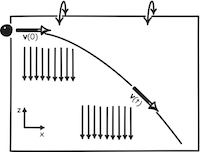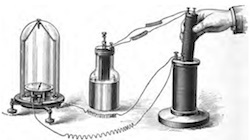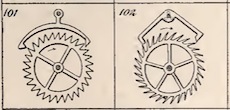John D. Norton
Causation






Download.
John D. Norton
|
||
| home >> research >> causation | ||

|
I have developed a non-Humean critique of causation based on our failure to find a viable principle of causality. I explain the applicability of causal notions by analogy to the applicability of notions like caloric and gravitational force. Both of the latter are now discarded by our fundamental science but returned to us in restricted domains, where they have considerable utility. | "Causation as Folk Science""Causation as Folk Science," Philosophers' Imprint Vol. 3, No. 4 reprinted in pp. 11-44, H. Price and R. Corry, Causation, Physics and the Constitution of Reality. Oxford: Oxford University Press. Dowload English or Italian translation. |
| A PUZZLE. A point mass can slide frictionlessly over the surface of the dome shown at left. It sits at rest at the exact apex and the surface is symmetrical in all directions. What will happen next? The mass might remain at rest at the apex indefinitely, just as you would expect. But other behavior is compatible with Newtonian physics. After an unspecified time--a day, a week, an eon--the mass can spontaneously move off in any direction. How is that possible? | See "The Dome: A Simple Violation of Determinism in Newtonian Mechanics" in Goodies. | |
 |
In "Causation as Folk Science," I urged that the world does not conform at a fundamental level to some robust principle of causality. To defend this view, I now argue that the causal notions and principles of modern physics do not express some universal causal principle, brought to light by discoveries in physics. Rather they merely assert that, according to relativity theory, spacetime has an invariant velocity, that of light; and that theories of matter admit no propagations faster than light. | "Do the Causal Principles of Modern Physics Contradict Causal Anti-Fundamentalism?" pp. 222-34 in Thinking about Causes: From Greek Philosophy to Modern Physics . eds. P. K. Machamer and G. Wolters, Pittsburgh: University of Pittsburgh Press, 2007. Download. |
 |
Elsewhere, I have urged that science is not grounded in a factual principle of causality. Matthias Frisch, however, in "Causal Reasoning in Physics," has identified a computation in the physics of scattering theory that, according to standard text books, requires a principle of causality for its completion. I argue that this supposed application is merely the adding of causal labels to an already presumed fact; and that the principle called upon is either false or too vague and ambiguous to be serviceable. | "Is There an Independent Principle of Causality in Physics?" British Journal for the Philosophy of Science, 60 (2009), pp. 475-86. Download. |
 |
Curie's principle asserts that every symmetry of a cause manifests as a symmetry of the effect. It can be formulated as a tautology that is vacuous until it is instantiated. However instantiation requires us to know the correct way to map causal terminology onto the terms of a science. Causal metaphysics has failed to provide a unique, correct way to carry out the mapping. Thus successful or unsuccessful instantiation merely reflects our freedom of choice in the mapping. | "Curie's Truism." Philosophy of Science, forthcoming. Download. |
 |
Metaphysicians believe that they have uncovered a deep truth about how things must connect in the world, antecedent to all science: the principle of causality. They are mistaken. | "How Not to Think About Causation." Filozofuj! 2019, No.3, pp. 16-18. Read in Polish or English. |
 |
Contrary to Hume, science has found many ways in which things connect with other things in the world. Causal metaphysics, however, has failed to add anything factual to the relations discovered by science. It is at best an exercise in labeling that may have practical uses. | "The Metaphysics of Causation: An Empiricist
Critique." pp. 58-94 in in Yafeng Shen, ed., Alternative Approaches to Causation. Oxford: Oxford University Press, 2024. Download. |